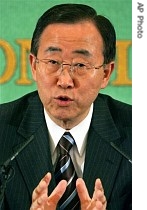2006年VOA标准英语-Newsmaker Profile: Ban Ki-moon - UN Secretary-G(在线收听)
By Andre de Nesnera
Washington
07 November 2006
South Korean Foreign Minister Ban Ki-Moon will succeed Kofi Annan as United Nations secretary-general on January 1.
 South Korea's Foreign Minister Ban Ki-moon gestures while answering questions at a press conference in Tokyo |
||
Mr. Ban becomes the eighth secretary-general in the U.N.'s 60-year history and is the first person to assume that position from Asia since U Thant of Burma, held the post from 1962 to 1971. Mr. Ban succeeds Kofi Annan of Ghana, who will retire at the end of December after a decade in office.
Donald Steinberg, U.N. expert with the International Crisis Group, says the Ban Ki-moon is a career diplomat.
"He's spent 35 years as a servant in the ministry of foreign affairs and other departments within the [South] Korean government," Mr. Steinberg noted. "He's played some role at the United Nations in the past - he served there back in the 1970s. He was the head of the U.N. division in Seoul. He was ambassador to Vienna where he worked on a wide variety of nuclear issues. He also served as chief of cabinet for the president of the 66th session of the U.N. General Assembly."
Steinberg and other experts believe Mr. Ban was appointed because he was considered to be a "safe" choice, in other words, none of the five permanent members of the Security Council objected to his candidacy.
Former U.S. National Security Adviser General Brent Scowcroft says Mr. Ban's nomination is an interesting development, particularly for Washington.
"For the first time in the history of the United Nations, an ally of one of the permanent members of the Security-Council is the secretary-general," he noted. "That's never happened before."
Many analysts say Mr. Ban, a low-key diplomat, will be very different from Kofi Annan, who was a strong public voice, talking about human rights, development and the plight of the poor.
But Nancy Soderberg, former U.S. alternate representative to the United Nations, says it is too early to tell what kind of a U.N. secretary-general Mr. Ban will be.
"You don't really know what's inside a human being when they are propelled to great positions of power," she said. "So I think we are just going to have to wait and see. Kofi Annan was viewed as a U.N. bureaucrat at the time as well and when he was elevated from within the U.N. system to secretary-general, he blossomed into this visionary, very tough historic figure. So we'll have to wait and see whether the new secretary-general emerges in that light."
What is clear, analysts say, is that Mr. Ban inherits an organization in transition. It will be Mr. Ban's challenge to continue the reform process started by his predecessor.
Former U.N. Under-Secretary General Brian Urquhart says Ban Ki-moon will also have to tackle major international issues.
"You have the ongoing problem in the Middle East, which has huge repercussions on everything else, particularly the situation in Iraq," he said. "You have terrorism, which the United States attaches enormous importance to. You have global warming. You have poverty, which is a huge problem. You have the down side of globalization, which is another huge problem. I mean -- he's not going to be short of work."
Analysts say Mr. Ban faces a delicate balancing act. On the one hand he must manage and reform an international institution, while at the same time use diplomacy and persuasion to try to resolve some of the world's most intractable problems.